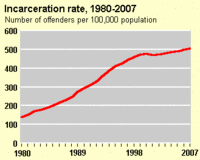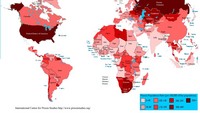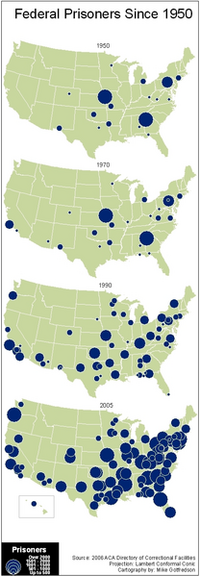
According to the U.S. Department of Justice,
the number of sentenced inmates incarcerated under state and federal jurisdiction per 100,000 population has increased from 139 in 1980 to 507 in 2007.
That’s more than tripled.
That also gives the U.S.
the highest per-capita prison population of any country in the world.
Also the
biggest prison population;
bigger by far than China or Russia:
The United States has the highest incarceration rate and the biggest prison population of any country in the world. Even though the United States represents only 5 percent of the world’s population, it has 25 percent of the world’s prison inmates.

And in the U.S., according to the Institute for Southern Studies,
the South has even higher prison populations per capita.
When it came to locking people up, Louisiana leads the South, and the
South leads the nation. Simply put: the South has more of its population
in prisons or jails than any other part of the country.
Since 1980, the country’s prison population has quadrupled to more
than two million, with the South accounting for nearly half of
that increase. The prison population increase can be attributed
largely to “tough-on-crime” criminal justice policies enacted in
the 1980s and 1990s. Among them are mandatory drug sentences,
“three-strikes-and-you’re-out” laws for repeat offenders, and
“truth-in-sentencing” laws that restrict early releases. These draconian
policies uniquely
hurt the South, especially where enacted with key
backing from “get-tough-on-crime” lawmakers (resulting in, among other
things, the
disenfranchisement of millions of potential Democratic voters).
 The effects of the Drug War and its resulting surge in incarceration were
also especially hard-felt in the South. By 2000, nine of the 20 states
with the highest incarceration rates were in the South. And by 2008, 10
of the 20 states with the highest rates were in the South. Prevention,
treatment and re-entry programs have been slashed while prison budgets
continue to rise.
The effects of the Drug War and its resulting surge in incarceration were
also especially hard-felt in the South. By 2000, nine of the 20 states
with the highest incarceration rates were in the South. And by 2008, 10
of the 20 states with the highest rates were in the South. Prevention,
treatment and re-entry programs have been slashed while prison budgets
continue to rise.
The racial disparity of these policies has been tremendous: Nationally,
black adults are four times as likely as whites to be under correctional
control. One in 11 black adults — 9.2 percent — was under correctional
supervision by 2008. And because the majority of African Americans live
in the Deep South (the highest populations are in Mississippi, Louisiana,
and Georgia respectively), the racial disparities of “get-tough” policies
have been disproportionately felt there.
It seems that crime and punishment is now a dominant industry in the Deep
South. By 2008, the top five states with the highest adult incarceration
rates were in the South: Louisiana leads the way, with one out of every
55 residents behind bars. Mississippi, Georgia, Texas, and Alabama finish
off the top five.
So, even if,
as the VDT says, jail deaths in Lowndes County, Georgia, are
no higher than in Fulton or DeKalb Counties,
why are the jail populations in all those counties so high in the first place?
Is it because there are more criminals in the South?
Apparently not:
Dealing out longer sentences and putting more people behind bars have been
the hallmarks of Southern states,
Gelb told CNN. “The huge differences
between states are mostly due not to crime trends, or social and economic
forces,” he said. “The rates are different mostly because of choices
that the states have made about how they respond to crime.”
The ISS article goes on to suggest several alternatives already tried
and shown to work in Texas and other states.
 Walter Cronkite died today. I’ll remember him by
what he fought for:
Walter Cronkite died today. I’ll remember him by
what he fought for:


